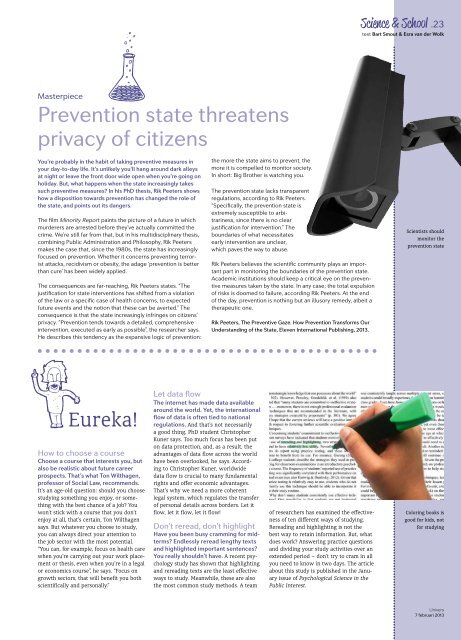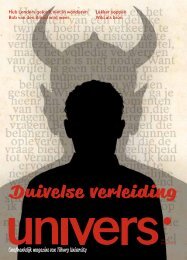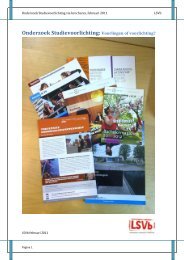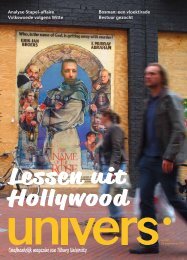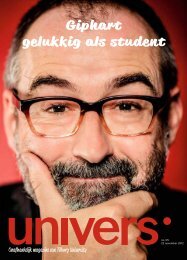Pech met je promotor - Univers
Pech met je promotor - Univers
Pech met je promotor - Univers
Create successful ePaper yourself
Turn your PDF publications into a flip-book with our unique Google optimized e-Paper software.
Masterpiece<br />
Prevention state threatens<br />
privacy of citizens<br />
You’re probably in the habit of taking preventive measures in<br />
your day-to-day life. It’s unlikely you’ll hang around dark alleys<br />
at night or leave the front door wide open when you’re going on<br />
holiday. But, what happens when the state increasingly takes<br />
such preventive measures? In his PhD thesis, Rik Peeters shows<br />
how a disposition towards prevention has changed the role of<br />
the state, and points out its dangers.<br />
The film Minority Report paints the picture of a future in which<br />
murderers are arrested before they’ve actually committed the<br />
crime. We’re still far from that, but in his multidisciplinary thesis,<br />
combining Public Administration and Philosophy, Rik Peeters<br />
makes the case that, since the 1980s, the state has increasingly<br />
focused on prevention. Whether it concerns preventing terrorist<br />
attacks, recidivism or obesity, the adage ‘prevention is better<br />
than cure’ has been widely applied.<br />
The consequences are far-reaching, Rik Peeters states. “The<br />
justification for state interventions has shifted from a violation<br />
of the law or a specific case of health concerns, to expected<br />
future events and the notion that these can be averted.” The<br />
consequence is that the state increasingly infringes on citizens’<br />
privacy. “Prevention tends towards a detailed, comprehensive<br />
intervention, executed as early as possible”, the researcher says.<br />
He describes this tendency as the expansive logic of prevention:<br />
Eureka!<br />
How to choose a course<br />
Choose a course that interests you, but<br />
also be realistic about future career<br />
prospects. That’s what Ton Wilthagen,<br />
professor of Social Law, recommends.<br />
It’s an age-old question: should you choose<br />
studying so<strong>met</strong>hing you enjoy, or so<strong>met</strong>hing<br />
with the best chance of a job? You<br />
won’t stick with a course that you don’t<br />
enjoy at all, that’s certain, Ton Wilthagen<br />
says. But whatever you choose to study,<br />
you can always direct your attention to<br />
the job sector with the most potential.<br />
“You can, for example, focus on health care<br />
when you’re carrying out your work placement<br />
or thesis, even when you’re in a legal<br />
or economics course”, he says. “Focus on<br />
growth sectors, that will benefit you both<br />
scientifically and personally.”<br />
Let data flow<br />
The internet has made data available<br />
around the world. Yet, the international<br />
flow of data is often tied to national<br />
regulations. And that’s not necessarily<br />
a good thing, PhD student Christopher<br />
Kuner says. Too much focus has been put<br />
on data protection, and, as a result, the<br />
advantages of data flow across the world<br />
have been overlooked, he says. According<br />
to Christopher Kuner, worldwide<br />
data flow is crucial to many fundamental<br />
rights and offer economic advantages.<br />
That’s why we need a more coherent<br />
legal system, which regulates the transfer<br />
of personal details across borders. Let it<br />
flow, let it flow, let it flow!<br />
Don’t reread, don’t highlight<br />
Have you been busy cramming for midterms?<br />
Endlessly reread lengthy texts<br />
and highlighted important sentences?<br />
You really shouldn’t have. A recent psychology<br />
study has shown that highlighting<br />
and rereading texts are the least effective<br />
ways to study. Meanwhile, these are also<br />
the most common study <strong>met</strong> hods. A team<br />
the more the state aims to prevent, the<br />
more it is compelled to monitor society.<br />
In short: Big Brother is watching you.<br />
The prevention state lacks transparent<br />
regulations, according to Rik Peeters.<br />
“Specifically, the prevention state is<br />
extremely susceptible to arbitrariness,<br />
since there is no clear<br />
justification for intervention.” The<br />
boundaries of what necessitates<br />
early intervention are unclear,<br />
which paves the way to abuse.<br />
Rik Peeters believes the scientific community plays an important<br />
part in monitoring the boundaries of the prevention state.<br />
Academic institutions should keep a critical eye on the preventive<br />
measures taken by the state. In any case; the total expulsion<br />
of risks is doomed to failure, according Rik Peeters. At the end<br />
of the day, prevention is nothing but an illusory remedy, albeit a<br />
therapeutic one.<br />
Rik Peeters, The Preventive Gaze. How Prevention Transforms Our<br />
Understanding of the State, Eleven International Publishing, 2013.<br />
of researchers has examined the effectiveness<br />
of ten different ways of studying.<br />
Rereading and highlighting is not the<br />
best way to retain information. But, what<br />
does work? Answering practice questions<br />
and dividing your study activities over an<br />
extended period – don’t try to cram in all<br />
you need to know in two days. The article<br />
about this study is published in the January<br />
issue of Psychological Science in the<br />
Public Interest.<br />
Science & School .23<br />
text Bart Smout & Esra van der Wolk<br />
Scientists should<br />
monitor the<br />
prevention state<br />
Coloring books is<br />
good for kids, not<br />
for studying<br />
<strong>Univers</strong><br />
7 februari 2013


